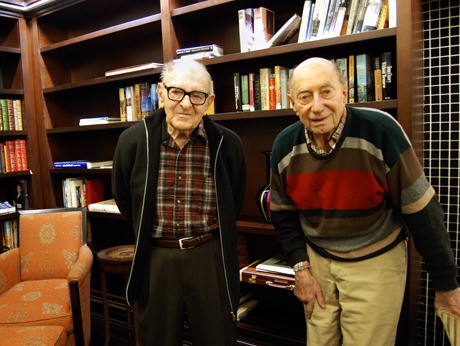High school classmates in Vienna reunite after 70 years
Coincidence. Interesting. Unusual. Those are the words that Otto Baumgarten and Fred Fiedler, both 87, use to describe the fact that the pair — once high school classmates in pre-war Vienna — ended up in the same retirement home, on the opposite side of the globe, more than 70 years later.
Today, the two men often share the same dinner table at Aljoya House with their wives. They greet each other in the hallway, sit together during weekend movies and chat over coffee in the bistro. What they don’t do is talk about Vienna. Despite the fact that they grew up in the same middle-class district. Despite the fact that they were classmates. Despite the fact that, being Jewish, they both fled the country after the Nazis invaded in 1938.
No, they don’t talk much about their shared past. After all, that was a long time ago.
“We didn’t recognize each other, of course. The last time we saw each other, we were 15,” said Baumgarten.
“16,” Fiedler corrected. “We were almost 16.”
It is the other residents of Aljoya House who take credit for the two men reconnecting. Learning that they were both from Vienna, Baumgarten and Fiedler were quickly introduced to each other. It wasn’t long before they discovered that they grew up in the same part of the city — Vienna District Number 18 — and that they attended the same Jewish religion course in high school.
Baumgarten remembers his former classmate well.
“I remember the name Fiedler. Fiedler, you know, means a violin player. I remember that name from our class,” he said.
Fiedler’s memories are more foggy.
“I don’t remember much about him,” the 87-year-old said.
Yet with a little prodding, both men were able to deduce that they were, indeed, high school classmates and friendly acquaintances.
Asked what it’s like to be reunited on Mercer Island seven decades later, the men shrugged their shoulders without much to say.
“It’s a coincidence,” said Fiedler.
“It’s interesting,” said Baumgarten.
Nothing more. The world is not so big, after all.
“There is a saying that there are six degrees of separation,” Fiedler said. “We were fewer than that.”
One may think that a shared past such as Baumgarten and Fiedler’s would kindle hours of conversation. Yet the two men are not drawn to the subject.
“I do not have such fond memories of Vienna. I was the only Jew in my class, so I was beaten up quite regularly. I wasn’t a good student either. I actually flunked out,” Fiedler confessed.
But once he immigrated to America in 1939, Fiedler re-embraced education and flourished academically.
“At South Bend High School in Bend, Ind., I suddenly discovered that I enjoyed school. I think it was because I was away from my family,” he said, explaining that his parents had fled to China while he was sent to live with U.S. relatives. “It was a great adventure for me, to be by myself in America. I did quite well.”
Fiedler would not see his parents until 10 years later as a married man who carried a PhD in Clinical and Industrial Psychology from the University of Chicago.
When Fiedler moved to Seattle to work as a psychology professor at the University of Washington (where he founded the Organizational Effectiveness Group, authored eight books, 150 articles and earned nine scientific research awards before retiring as Professor Emeritus in 1993), he brought his young wife, Judith, with him. She is still with him today at Aljoya House, 63 years later.
“I couldn’t have been more fortunate in my life. I ended up in a job that I loved and I was very good at it. Judith and I have been successfully married for 63 years. I could never have done [in Austria] what I have done here,” Fiedler said.
Baumgarten is also happily living at Aljoya with his wife, Ronnie. Yet his path to Mercer Island is much different than Fiedler’s.
Baumgarten left Vienna in December of 1939 with his parents. With few options for refuge, the family ended up living in the bowels of a coal ship floating along the Danube River. They spent more than a month in what Baumgarten called “the tightest space imaginable” before the British intercepted the ship. The family was sent to a detention camp in Haifa, Palestine, where Baumgarten lived until 1951 when he, too, immigrated to the United States.
“My parents [got a visa] to America in 1946. I had to wait until 1951,” the Aljoya resident said.
Baumgarten took his knowledge of business and household appliances with him. After settling into his new life in Seattle, the WWII refugee founded his own business: ABLE Appliance Service. The company still exists today.
Looking back, both men are happy with the diverging paths their lives took. Indeed, there is a poetic symmetry to their collective past.
“This is the first surprise like this in my life,” Baumgarten said on meeting Fiedler. “Vienna had 1,875,000 people at the time and 175,000 Jews. I would say meeting again here is a coincidence.”
“Yes, it is a coincidence,” Fiedler added.



